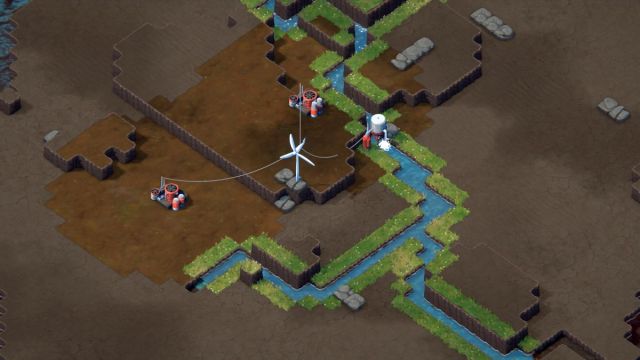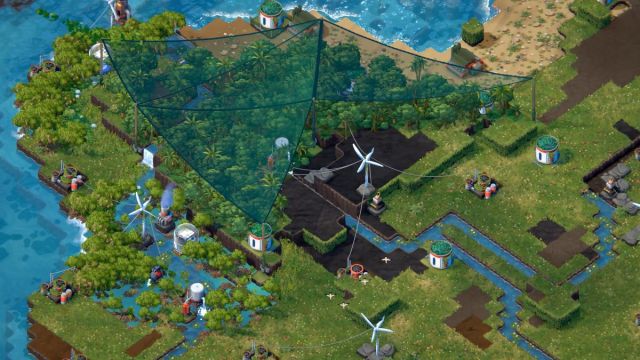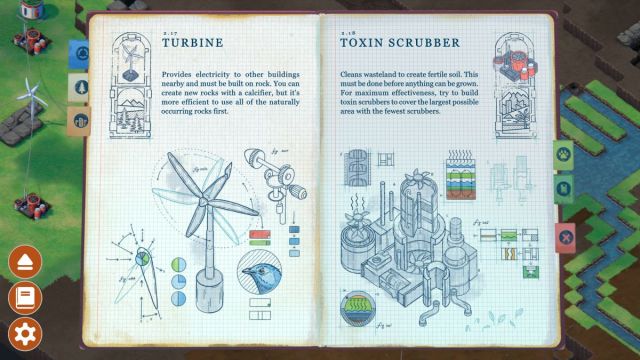Build it up and tear it all down
Most city-builders are about expanding and growing. The goal is to take a natural, untamed world and bend it to your benefit, turning the realm into a humming machine for resources and production. Terra Nil, however, does the inverse.
Rather than creating a monument to your designs, Terra Nil is a reverse city-builder from BroForce studio Free Lives. It asks you to take the barren, scorched earth and fill it with life. You restore the grasslands, let water flow down canals, and crack the earth to restore the ecosystem. And then, at the end, you pack up and leave, with only nature in your wake.
This particular game has been on my radar for a while now, and publisher Devolver Digital recently confirmed that Terra Nil is planned for launch on March 28, for PC and Netflix. Ahead of the release, we had a chance to sit down with lead artist Jonathan Hau-Yoon to talk about how the team approached this unique take on building.
Caught in a jam
While Free Lives may be well-known for releases like BroForce or Genital Jousting, Terra Nil is outside the realm of blasting bits or flopping dicks. The concept originated from Free Lives’ Sam Alfred, who conceived it as part of a Ludum Dare game jam with the theme “start with nothing.” The “compo” version of the game was made from the ground-up in 48 hours, and placed fourth overall. But game jam origins aren’t new to Free Lives.
“All of our games have originated from game jams, which allows us to be quite experimental and try out novel ideas,” said Hau-Yoon. “I think that that’s why Free Lives has made a patriotic pixel art platformer, a VR gladiator game, a penis-themed party game and a two button mobile sports simulator. We have countless other jam games that haven’t quite made the cut for being a commercial title.”
For Terra Nil, Hau-Yoon attributes the concept to both Alfred’s previous use of buildings and grids, and to growing up in South Africa. Growing up there, they were never far from a hiking trail.
“South African education also has quite a leaning toward conservation and an appreciation for natural beauty,” said Hau-Yoon. “The Big Five appear on our bank notes, and many people holiday at national parks and game reserves. It’s a source of national pride and a big driver of tourism. So some parts of the game, like the relationship between fynbos and fires, and how fires are necessary for many of our plants to grow, is inspired by that knowledge.”

Breathing life into the planet
The Free Lives tam has done research into different real-world phenomena, like coral restoration and shade cloths, or fences used to protect beaches from erosion.
“Otters have pockets in their armpits! Flamingos are pink because of their diet” said Hau-Yoon. “Now, these don’t necessarily make it into Terra Nil as-is, but we get excited about them. We are inspired by nature and conservation, but we often bend reality around what makes for a game mechanic that’s more intuitive or easier to understand, or that thematically fits better with some of the other mechanics in a map.”
In practice, you can see this as controlled burns elicit new variety in the ecosystem. Through tiny modifications and a little bit of video game magic, Terra Nil gives you the power fantasy of taken a lifeless patch of dirt and seemingly breathing life back into it.

Green serenity
A big part of the appeal is the emotions and feeling Terra Nil can exhibit. When I first previewed the game, I was amazed by just how calming it all felt. City-builders are normally pretty stressful affairs; games like Banished ask you to watch constantly climbing and falling numbers, each of which could spell either prosperity or doom.
Terra Nil does have multiple difficulty options, to allow the optimizers to min-max their way to a green future and for more casual enjoyers to simply soak in the sun. A Zen mode, though, really highlights the effectiveness of Free Lives’ design.
When you plant a building, there’s a soft flutter and cascade of sound as grass flows over the barren earth. The soft torrent of water feels almost tangible when you hear it rush through canals. Even fire and lava crackle in incredibly pleasing ways. It’s no surprise that, as Hau-Yoon describes it, the goal of in-house sound designer Jason Sutherland was to create a sound palette that sounds physical.
“Searching for the different sounds created by the different buildings, biomes and animals should in itself be an adventure, and we wanted someone who listened to the game playing with their eyes closed to have a bit of an ASMR, that their ears would prick at the sound of a frog or a bubbling waterfall,” said Hau-Yoon.
The visuals were also made soft, inspired by Kazuo Oga’s work on Studio Ghibli films. It’s all calm, soothing, and serene.

You can rebuild
As Hau-Yoon tells me, the team found that the “main character” of Terra Nil was not the “city’ itself. Other builders focus on the buildings you create and maintain, the factories that produce, and the people that staff them. But in Terra Nil, the focus is nature itself. You build things to see what they create, and how they combine. An arboretum can make a forest, which can house trees, and those can house beehives. One begets another. And eventually, your role in this building is done.
The idea of building it all and then leaving, deconstructing all your artificial architecture to leave only a slice of nature behind, is thematically potent. There is no grand city sprawl at the end of this. Just nature.
Hau-Yoon says they hope Terra Nil renews players’ interest in the environment and conservation efforts. But they also hope it eases some anxiety and helps them to relax. I know for me, Terra Nil is looking like a very peaceful game to cool down with, accompanied with a glimmer of hope for our own reality.
Terra Nil goes live on PC and Netflix on March 28.








